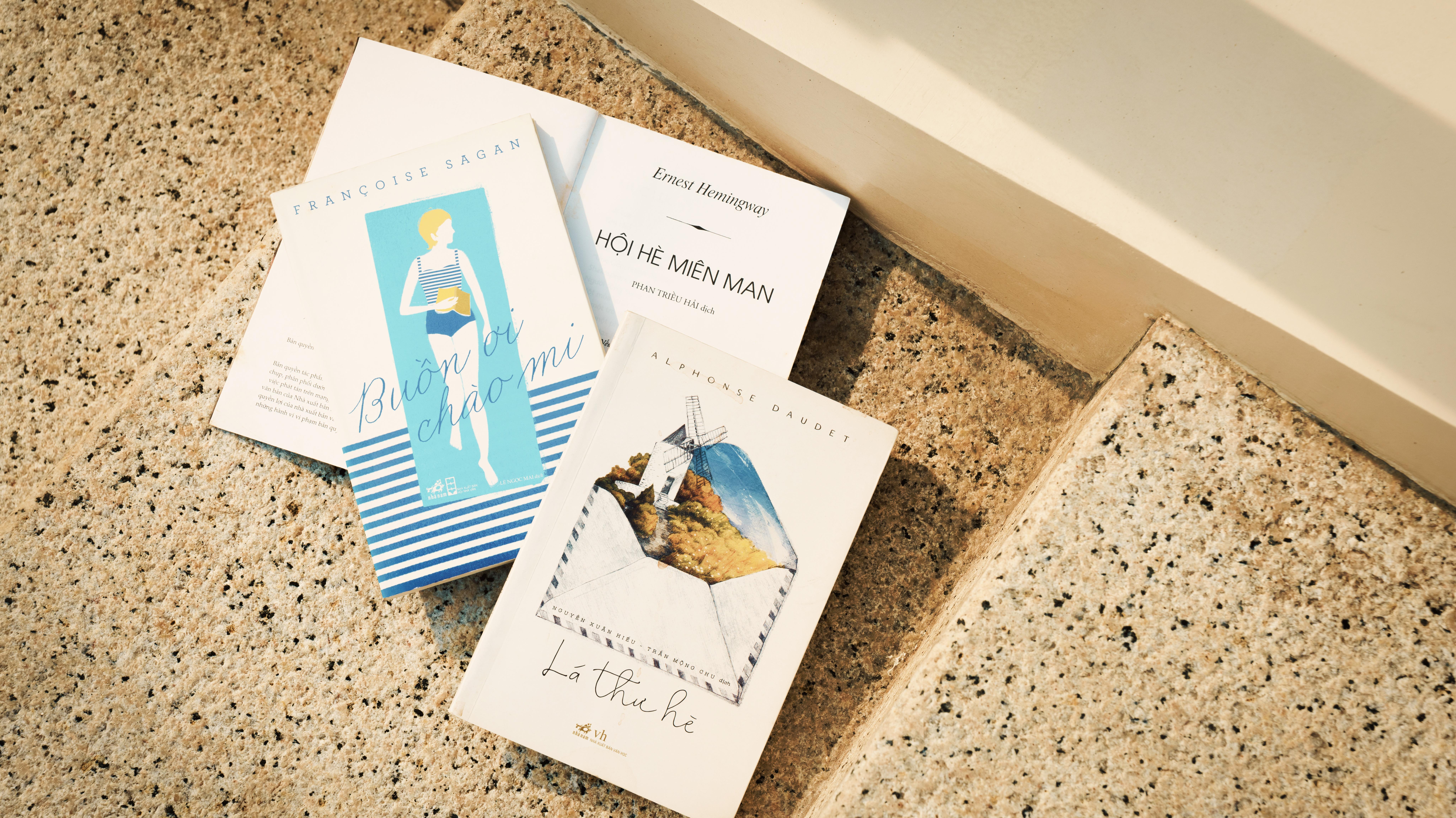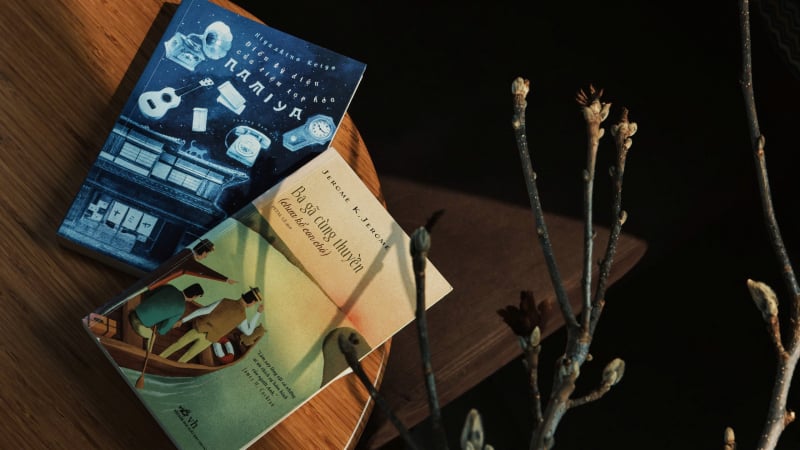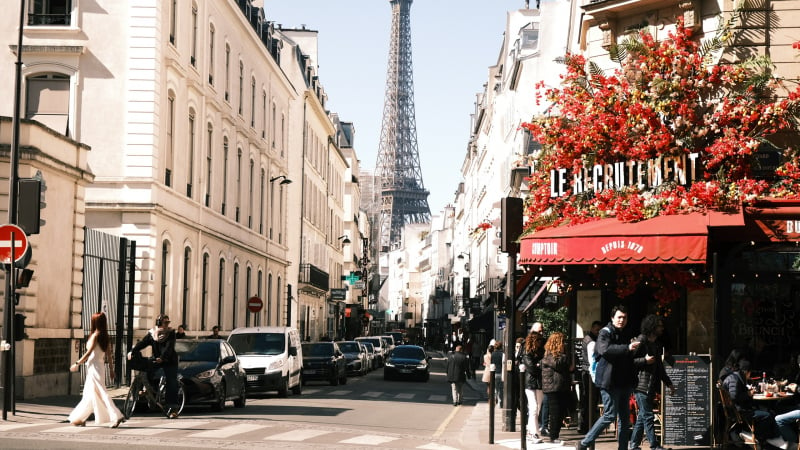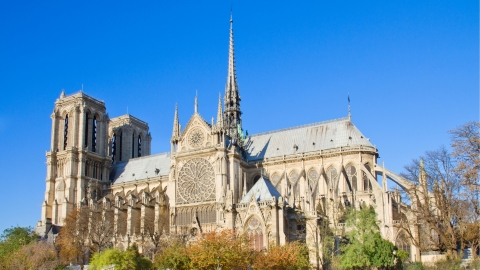Paris, magnificent with its streets along the Seine River, its small bookstores, its cultural salons, and its chilled glasses of white wine that ignite the burning passion of youth. From Paris, I let my soul drift back to 19th-century Provence through Alphonse Daudet's Summer Letters, where endless, free, and unrestrained summer fields adorned the borders of those innocent days.
But the South of France is not just about sweetness and tranquility; undercurrents, the scorching summer sun, and the unavoidable sadness of youth, of impulsiveness and naivety, have taken over the "journey" with the poignant story of one of France's most prominent writers, Francoise Sagan.
A FESTIVAL THAT ENDURES - "There's never an end to Paris"
Of the three authors who wrote so passionately about France—Ernest Hemingway, Alphonse Daudet, and François Sagan—only Hemingway was an American writer. However, after reading *A Feast of the Passion*, one can clearly feel the overflowing affection that this great writer had for Paris. This affection is perhaps even more intense and poetic than that of a true Frenchman.
"If you are lucky enough to live in Paris during your youth, then no matter where you go for the rest of your life, it will always be with you, because Paris is a never-ending celebration."

A Feast of Endless Fun - Ernest Hemingway
A Night Out is Hemingway's memoir about his time in Paris with his wife Hadley from 1921 to 1926 while writing. Although a memoir, it has the feel of a novel, divided into chapters, each with its own complete and interconnected story. The language in A Night Out remains vividly descriptive, characteristic of Hemingway, especially in his descriptions of his elegant experiences in Paris, despite the extremely difficult economic circumstances faced by Hemingway and his wife. But it was Paris, and they were young at the time!
They could enjoy the Luxembourg Gardens on an empty stomach or stroll carefree through art museums to admire paintings. Afternoons spent sitting over a cup of coffee, discussing literature with writers and poets whose names are instantly appealing in chapters like "F. Scott Fitzgerald," "A Very Good Cafe on St. Michel Square," "Sitting in the Dôme with Pascin," "Evan Shipman at Lilas Cafe," and he even dedicated an entire chapter to the famous bookstore; to this day, one of the most visited tourist destinations in Paris: "Shakespeare and Company," through which readers learn about the bookstore owner, Sylvia Beach, and the interesting anecdotes about the place and its owner.


Small bookstores and streets in Paris
Although throughout the book Hemingway names places and cafes as suggested destinations and speaks of them as places of remembrance that shaped his youth, Paris through Hemingway's lens is not just a fleeting visit, but a life intertwined with the writer's destiny. Hemingway's Paris is a city with every sound, flavor, and way of life.
He described in detail the mornings when people delivered goat's milk, the fragrant loaves of bread filling the air and wafting into his nostrils. He wrote long passages describing the Seine River with its throngs of people fishing, and the roadside bookstores selling English books that few people bought. Most notably, the iced coffee with cream and chilled white wine were always present in Hemingway's life. If it's said that "even leisure requires much effort," then perhaps Hemingway chose the right place to elevate his literary soul. Surely, there is no other place in the world that could inspire him to put pen to paper:


“There is never an end to Paris, and the memories of each person who has lived in this city are unique. We always return there, no matter who we are, no matter how much the city changes, and whether there are difficulties or advantages, the city remains within reach. Paris always deserves that, and we receive in full what we give to it.”
But this Paris is from the beginning. When we were very poor and happy.”
Do we, modern people today, feel the same way when we talk about Paris? The city of freedom and an undying spirit of liberation, of soaring artistic souls, yet also harboring an untamed rebellion, just as the people of this city are born and raised.
PROVENCE AND SOUTHERN FRANCE - Memories and Forgetting
While Hemingway was nostalgic for Paris, Alphonse Daudet humorously wrote in his Summer Letter:"And now how can you expect me to miss your noisy city of Paris?"Similarly to how Francoise Sagan describes in the very first chapters her feelings of being immersed in the waters of the Mediterranean Sea, she writes:“The cool, clear water I plunged into, I struggled to wash away all the darkness, all the dust of Paris.”

Summer Letter - Alphonse Daudet
Two French writers, separated by centuries, wrote stories set in Southern France with vastly different contexts, customs, and people, yet they intersected at one point: they both chose the peaceful, beautiful, and gentle Provence to convey their youthful emotions. Alphonse Daudet chose Provence to commemorate the beautiful days of his youth.
"This work reminded me of the most beautiful moments of my youth. The wild laughter, the carefree moments of passion, the faces and figures of friends I would never see again."

Alphonse Daudet chose Provence to commemorate the beautiful days of his youth.
As for Francoise Sagan, she chose this place to bid farewell to the remaining naivety and innocence, as her character says, "Goodbye, Sadness." Francoise Sagan, then barely twenty years old, wrote a youthful sadness that pierced the soul, penetrating the scorching heat of the Mediterranean in "Goodbye, Sadness." The detail of Cécile's father needing to go and pick up the special woman of his life at Frejus station helps us imagine the story is also set against the backdrop of Provence, in southern France. This southern region is considered a precious jewel of the Mediterranean; This place is not only famous for Provence but also for Nice with its emerald-blue sea, or symbols of art and luxury like Cannes, and the "lemon town" of Menton… In this place of abundant and sweet nature, some come to have its sparkling beauty evoke memories of the most beautiful moments of their lives, while others want to immerse themselves in the melancholic, wistful emotions of lost youth under the waves and the scorching June sun.
The heat of first stirrings of emotion, of first physical touches, of dreamy afternoons on the beach, golden sand clinging to hair and skin, soaked with her own sweat and that of her lover; the heat of a free, carefree life always full of passion and burning desire; the heat of envy; the heat of adolescence, of a young girl ready to burn everything. And then they burned everything to ashes, burning away an entire brilliant and scorching summer, and from there, she felt the smoldering heat of sadness, smoldering and smoldering, spreading and spreading. And she looked at it with dreamy eyes: "Goodbye, sadness" - Goodbye, my friend. Bonjour Tristesse!

Goodbye, Sadness - Francoise Sagan
Sagan's writing style is elegant and sparkling, yet straightforward and full of emotion. Combined with a tight plot and natural progression, readers easily become engrossed in the unfolding events of her works. The author once confided: "I would live very carelessly if I didn't write, and I would write very carelessly if I didn't live." In her later years, Sagan lived a difficult life. In 2002, she received a suspended prison sentence for tax fraud. On September 24, 2004, she died of heart failure at the age of 69. In his eulogy, French President Jacques Chirac wrote: "France has just lost one of its most talented and influential writers – an outstanding figure in literary life." It could be said that sadness brought glory to Francoise Sagan. Sadness was her companion during her youth, but it was also sadness that ultimately plunged her into the regret of her readers.
Meanwhile, going back in time to the 19th century, Alphonse Daudet, a brilliant French writer and a son of Nimes, wrote *Summer Letters*, a collection of short stories of varying lengths, recounting the lives, anecdotes, and experiences he himself witnessed and contemplated while in an abandoned windmill in Provence. These picturesque stories depict a colorful Provence, guiding our minds on a journey across the meadows, the azure skies, and the golden or crimson hues of a beautiful but fleeting period of youth.
“A lovely pine forest, bathed in light, slopes gently down before me, all the way to the foot of the hill. The small Alpilles stand out on the horizon… Occasionally, from afar, I hear the sound of a flute, the chirping of a bird in the lavender bushes, the sound of music on the road… This entire beautiful Provence landscape seems to live on light.”

It is also in *Summer Letters* that the Mediterranean region is expanded, allowing readers to reach Corsica, the bay of Ajaccio… “a beautiful place I sought to let my soul wander and live alone,” even though it is a land often affected by “mistral” winds (a special type of wind unique to the French Mediterranean and often very strong). But if one can withstand those gusts, then before one's eyes lies a seascape so beautiful that one no longer dreams or thinks; one seems to transcend oneself, transforming into a seagull and soaring upwards, “the foam bobbing on the waves under the sunlight, the white smoke rising from the ship sailing out to sea, the coral-gathering boat with its red sail, this pearl, that mist—you are everything, only no longer you. Oh!”
When we read *A Summer Letter*, perhaps we will understand why Daudet chose Provence as the central theme for his collection of short stories. A land of nothing but beautiful nature and light, it is an absolutely ideal place to reflect on the most beautiful and innocent memories of life.
“That was a time when everything was still preserved in a glass jar, illuminated by sunlight from a thousand angles. A time of fragility and dizziness, of waves of emotion that came and went. A time of happiness and even pain that was beautiful. A glorious time in our memories. Now, unexpectedly, it knocks on the door, visiting after so many years of separation.”

Alphonse Daudet's youth didn't unfold in Southern France, but it's fondly remembered right here, in the beautiful and gentle Provence, with its first stirrings of emotion, like the shepherd boy gazing at his mistress asleep under the starry sky, his heart filled with pure, overwhelming love in "The Stars." Or the people who taught him empathy and courage in "The Secret of Old Cornille." Or the passions, sometimes shallow and foolish, he recounts through the life of "Mr. Seguin's Goat," who leaves home to find a new, higher, broader horizon on a distant mountaintop. He tells this story with a romantic yet incredibly sincere and humorous tone, imbued with a distinctly French character. He tells it in a way that evokes the scent of fragrant grass in the Provence fields, as if bathed in sunlight on the hillsides, and with eyes sparkling with the mysterious light of the stars.
Alphonse Daudet did not stop at constructing a serene, measured picture, but rather a world formed from contrasting realities: the opulent Paris and the peaceful Provence; the bustling city and the tranquil countryside; development and tradition... From this, we see that every picture in Daudet's literature undergoes transformation; the reader is transported back to the past while simultaneously understanding the changes brought about by the laws of societal growth and development. It is the love in the innocent and pure heart of his youth that keeps everything in his writing balanced, ultimately leaving behind a beautiful sense of nostalgia, for the wonderful things that have come and gone. Only the places and emotions remain, occasionally leading us back to where we once were.

The world is vast and time is limited, but I am always secretly grateful for literature and books. If my feet cannot yet reach the lands my eyes yearn for, let the words, stories, and people within those pages gently touch my soul. A journey into the realm of the mind. A literary pilgrimage to rediscover youth, to move into the future, to touch the present, to touch distant lands on this vast globe.
As the saying goes:“That’s the thing about books. They let you travel without moving your feet” - (Jhumpa Lahiri).

 VI
VI EN
EN



































